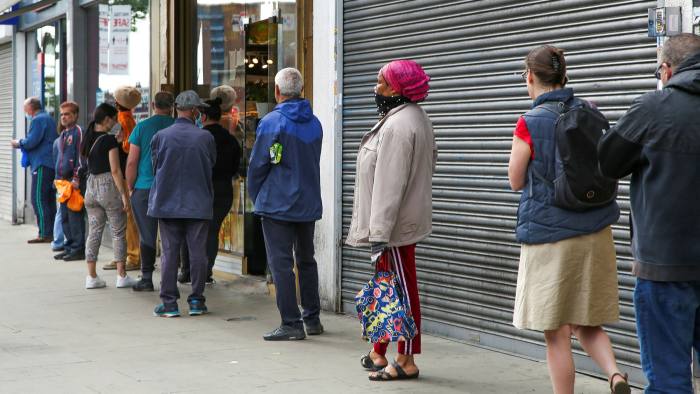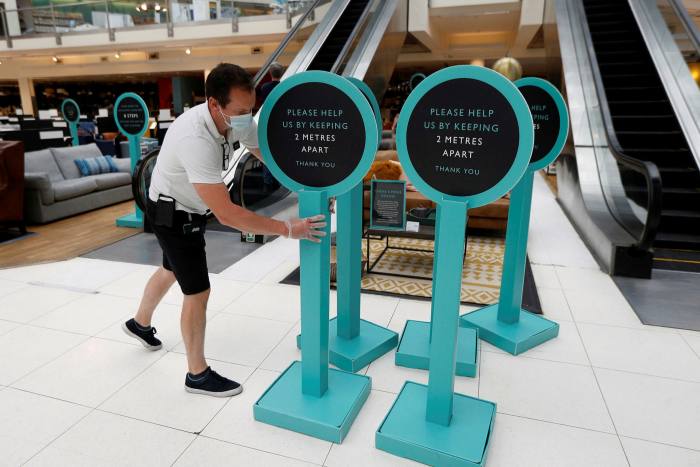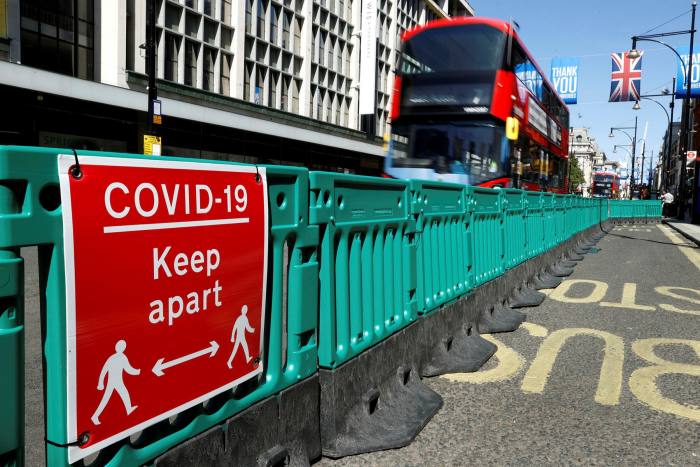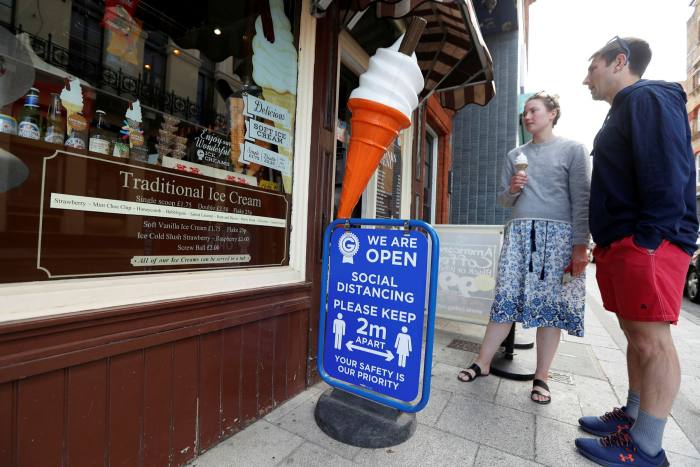
Get in line: British shoppers set for lengthy waits as high streets reopen
Consumers urged to stay calm and carry on spending as lockdown eases
by Alice Hancock, Daniel ThomasRetailers, banks and cafés are grappling with a very British problem: whether shoppers can be relied on to queue patiently when high streets finally begin to emerge from hibernation over the next few weeks.
Customers will face lengthy lines outside more shops and cafés as the lockdown eases, according to retailers, who warned the patience of the British public will be tested by the government’s social-distancing rules.
The problem has been raised with government officials over the past week, with trade groups asking how to best manage the expected crowds stuck outside stores during a meeting with small business minister Paul Scully.
The government last weekend said non-essential retail would be allowed to open in mid-June, adding to outlets already trading such as supermarkets and bike shops.
But store owners are worried about how they will manage when more shops are open, with numbers limited inside stores and queues stretched outside at 2-metre distances down often narrow streets.

“We are working with the government and local authorities to establish clear plans on managing public spaces once shops begin to reopen from 15 June,” said Helen Dickinson, head of the British Retail Consortium.
“When queueing to enter a store, we urge the public to be considerate of staff and their fellow shoppers, to follow signs and instructions and to maintain social distancing.”
Peter Cowgill, chairman of JD Sports, said queueing rules used for supermarkets would not work for high streets and shopping centres that do not have the space for single-file lines.
“We have our frontages next to other retailers, who will have their own queues,” he said. “It’s going to be a very difficult situation.”
He wants the government to reduce social distancing from 2 metre to 1 metre, as in some European countries, saying the current guidance will become “problematic when people start to spill into streets”.
Banks also have concerns about scuffles outside branches as more neighbouring businesses open.
Stephen Jones, chief executive of UK Finance, the banking sector lobby group, said he would be talking with ministers and local authorities to work on plans about how to manage high-street queues outside local branches.
“It's a very British issue. As the high street unlocks more comprehensively, there will need to be local queue management to address queues across multiple adjacent outlets. Some banks have expressed concerns about the possibility of unrest as a result.”
The government has committed £50m to help councils in England introduce safety measures to encourage customers back into shops and has appealed to the better nature of shoppers to maintain order. The money is coming from the European Regional Development Fund (ERDF).
“Shop owners and businesses along with the public have a shared responsibility to follow the advice on social distancing,” said Cllr David Renard, the Local Government Association economy spokesman.
“Social distancing looks set to play some part in our everyday lives for some time to come and the scale of the challenge facing our local economies as a result of this pandemic cannot be underestimated.”

Local trade groups and councils are working on plans to widen pavements, reroute foot traffic and pedestrianise parts of shopping streets. In London, the New West End Company, a local business group, has set out guidelines to prevent popular shopping areas around Oxford Street and Regent Street being overwhelmed.
These include having a staff member act as queue monitor to help avoid conflict with neighbouring premises, with lines set to the left of premises where possible and stopped from “snaking” or doubling-back.
If queues start to infringe on neighbouring premises, “staff members should encourage customers to return at a different time where possible,” it said.
Jace Tyrrell, chief executive of New West End Company, said retailers were being encouraged to not run sales in the first few weeks and stagger opening times: “It’s quite an operation.”
David Page, whose company Fulham Shore owns the pizza chain Franco Manca, said the business already had “queues out of the door” before the pandemic. “Now it is going to be even worse because we will only have 50 per cent capacity,” he said.
Mr Page said he would have timed sittings in some of the chain's locations. For sites that did not have pubs nearby, customers could be offered drinks in the queue, he added — another way to generate revenues.

Other companies have invested in technology to ease the pain of queueing. Steve Brown, chief executive of the ticketing technology company Accesso, said the business had a noticeable uptick in inquiries about its virtual queueing software in recent weeks.
The technology allows customers to register at the door of a business and go away until they are notified by text that it is their turn to go in. “It was invented out of convenience but now it is being viewed as a necessity,” Mr Brown said.
Clive Watson, chief executive of City Pub Company, said that when his pubs reopened they would only welcome customers that had pre-booked tables in order to avoid queues at the door.
“If we don’t regulate, it will be like VE Day in 1945, people will just go nuts,” he said, adding that pub operators had to show “social responsibility” in the way that they opened.